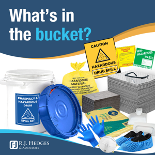July 2022 - Newsletter
Included in this newsletter
- Supreme Court Rules Doctors Need To Knowingly Mis-Prescribe Opioids For It To Be A Crime
- New Strike Force Targets Those Who Illegally Prescribe Opioids
- PA (Only) Orthotists, Prosthetists, and Pedorthist’s Rejects Licensure
- USP <800> Hazardous Drugs
- Compliance Portal® Spotlight- Patient Safety
- R.J. Hedges Bulletin Releases/Webinars

Supreme Court Rules Doctors Need To Knowingly Mis-Prescribe Opioids For It To Be A Crime
The Supreme Court on Monday (June 27, 2022) unanimously ruled that prosecutors need to prove that doctors knowingly prescribed drugs in unusual ways to win convictions against them for unlawful distribution of controlled medicines. The decision came in a case brought by two doctors sentenced to decades in prison for unlawfully prescribing opioids. The doctors argued they acted in “good faith” to care for their patients. Laws and regulations allow doctors to prescribe controlled substances, including opioids and medications for conditions like anxiety and ADHD, “for a legitimate medical purpose” in ways that fit with “the usual course of his professional practice.” At issue in the case was what threshold doctors had to cross for their prescribing patterns to go beyond treatment into what is effectively drug dealing.
This ruling should impact how DEA investigates pharmacies for opioid dispensing. We are unsure how this will change the new DEA Diversion requirements in the June Newsletter
New Strike Force Targets Those Who Illegally Prescribe Opioids
A new multi-state, multi-agency strike force will fight the illegal prescribing of controlled drugs, as the opioid epidemic continues to devastate the New England region.
A press conference held in Concord last week brought together criminal investigative leaders from the Department of Health and Human Services, the DEA and FBI, the U.S. Attorneys of New Hampshire, Maine and Vermont, and Assistant Attorney General Kenneth A. Polite, Jr., of the Justice Department’s Criminal Division. Click here for more information
PA (Only) Orthotists, Prosthetists, and Pedorthist’s Rejects Licensure
The Pennsylvania PALS licensing system is not issuing new licenses for O&P because both certification boards are not NCCA accredited. This issue will continue through the near future as the state legislature is on recess until mid-September. NSC has posted the following: "Certified providers: Those with a BOC or ABC certification have been viewed as "qualified providers" However, the "certifying bodies" ABC and BOC are no longer credentialled organizations with the NCCA since they do not meet the testing standards. Therefore a "certification" by either of the organizations should not be viewed as a basis for "qualified" but rather only a state licensed provider, those that meet the "qualifications" of a state licensing board should be viewed as "qualified provider." This licensing issue only affects Pennsylvania.
USP <800> Hazardous Drugs
We are hearing from a number of clients that USP <800> is regulated only by the state and the state pharmacy board is not being enforced. This may be true, but when USP <795> and USP <797> are released within the next couple of months, these states will begin inspecting hazardous Drugs. Currently, almost half of the states are now using USP <800> with their on-site pharmacy board inspections.
Another statement we are receiving is USP <800> is not federal law. However FDA through the Federal Food, Drug, and Cosmetic Act (FDCA), both USP and NF are recognized as official compendia. Title 21 CFR § 299.5(a&b) and FDCA § 501(b) and 502(e)(3)(b)
If an employee is injured within the pharmacy because of a hazardous drug, including not having the correct Personal Protective Equipment (PPE), the pharmacy can be held liable because of the Safety Data Sheet (SDS) requirements for handling and PPE.
Compliance Portal® Spotlight- Patient Safety
If you have the Pharmacy or Compounding Compliance Programs, you are enrolled with a Patient Safety Organization, Alliance for Patient Medication Safety (APMS). This program is found in the Quality Assurance chapter in the pharmacy and compounding programs. PBMs are asking for a Continuous Quality Improvement (CQI) certificate. This is where you obtain it.
To ensure currency and maintain the pharmacy’s compliance the following must be completed:
-
Pharmacist-In-Charge completes the annual questionnaire and training
-
Daily prescriptions fills are recorded, New and Refills
-
Strongly recommend a pharmacy technician runs daily totals for the week and enter the numbers on Saturday afternoon.
As a way to giveback to our loyal customers, we are giving away a FREE Spill Kit to the first 10 clients to call Jenny at (724)357-8380 ext.391

R.J. Hedges Bulletin Releases/Webinars
(found in the Message Center)
The following items can be accessed through the Message Center on the Compliance Portal®:
July Task List (07/01/2022)